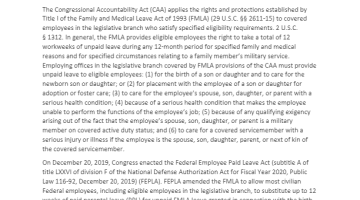Introduction
The Congressional Accountability Act (CAA) applies the rights and protections established by Title I of the Family and Medical Leave Act of 1993 (FMLA) (29 U.S.C. §§ 2611-15) to covered employees in the legislative branch who satisfy specified eligibility requirements. 2 U.S.C. § 1312. In general, the FMLA provides eligible employees the right to take a total of 12 workweeks of unpaid leave during any 12-month period for specified family and medical reasons and for specified circumstances relating to a family member’s military service. Employing offices in the legislative branch covered by FMLA provisions of the CAA must provide unpaid leave to eligible employees: (1) for the birth of a son or daughter and to care for the newborn son or daughter; or (2) for placement with the employee of a son or daughter for adoption or foster care; (3) to care for the employee’s spouse, son, daughter, or parent with a serious health condition; (4) because of a serious health condition that makes the employee unable to perform the functions of the employee’s job; (5) because of any qualifying exigency arising out of the fact that the employee’s spouse, son, daughter, or parent is a military member on covered active duty status; and (6) to care for a covered servicemember with a serious injury or illness if the employee is the spouse, son, daughter, parent, or next of kin of the covered servicemember.
On December 20, 2019, Congress enacted the Federal Employee Paid Leave Act (subtitle A of title LXXVI of division F of the National Defense Authorization Act for Fiscal Year 2020, Public Law 116-92, December 20, 2019) (FEPLA). FEPLA amended the FMLA to allow most civilian Federal employees, including eligible employees in the legislative branch, to substitute up to 12 weeks of paid parental leave (PPL) for unpaid FMLA leave granted in connection with the birth of an employee’s son or daughter or for the placement of a son or daughter with an employee for adoption or foster care.
